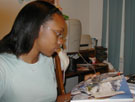| Maryland Newsline |
| Home Page |
Politics
|
| Marylander Who Thought of
Pentagon as 'Home' Fights Depression Following Terrorist Attack
Maryland Newsline Thursday, Oct. 18, 2001 Series: Tragedies' Footsteps LAUREL, Md. - Tamara Peyton is depressed, because her "home" has been violated. “I felt [the Pentagon] was my home, because I see it every day" on the ride to work, she says. Peyton, 25, works at the U.S. Patent and Trademark Office in Crystal City, Va., about 10 minutes from the federal military complex. She was at work Sept. 11, the morning a commercial jet slammed into the building. Although she doesn't see it as a life-changing event, she does admit to feeling lucky to be alive. And she recognizes the deadly crash's smaller impacts: She says she still has trouble concentrating at work, "Since I work so closely to the building." And she has varied her work schedule, to avoid traveling in rush hour. On Sept. 11, her mother dropped her off at work, as usual. At about 9:30 a.m., she was surfing the Web, checking the news, when she saw stories that a plane had hit the World Trade Center. Then the phone rang. It was Peyton’s mom telling her to get out of the building, because someone had just crashed into the Pentagon. “I told my mom she was wrong, that it was the World Trade. My mom said, 'No. It just happened. We’re being attacked.' " Checking the hallway, Peyton saw people running, saying, “ ‘There [is] smoke coming from the Pentagon.’ ” She left a hurried note for her boss, then began heading out. “It was pandemonium.” It was quieter outside. Most of her coworkers had gathered in front of their building, staring "almost hypnotically" at the smoke rising from the Pentagon. "I could hear them talking, but it was in such hushed tones that I couldn't make out whether it was fear or utter surprise that kept their voices low," she says. She just wanted to get home. She caught a train at the Crystal City Metro stop to Pentagon City, but there, she was told to leave the train because the station was closing. She tried to call her mother on a cell phone, but it was dead. So she went to a pay phone, about 30 feet from the Pentagon, where she could again see the smoke rising. "It was at that time that I started hearing the fire trucks and the rescue workers," she says. There, she met a woman with a Pentagon visitor’s tag. The woman told her that the attack had literally "jarred her out of her seat,” Peyton recounted. She encountered a man who told her “we are at war.” But for Peyton, the more pressing problem was getting home. With the Metro station closed, she tried the bus. She recalls being nervous on the ride. “I was fidgeting. I started mumbling to myself, 'I was just in New York. I saw the building. I was just there.' " After an hour on the bus, Peyton had traveled just three blocks. She recalls no one was paying attention to traffic signs, and there was an ambulance passing every five minutes. So she got off the bus and headed back for the train station, which she found had reopened. “Inside the train, everyone had a somber look. Just looking out the window.”
Copyright © 2001 University of Maryland College of Journalism
|

